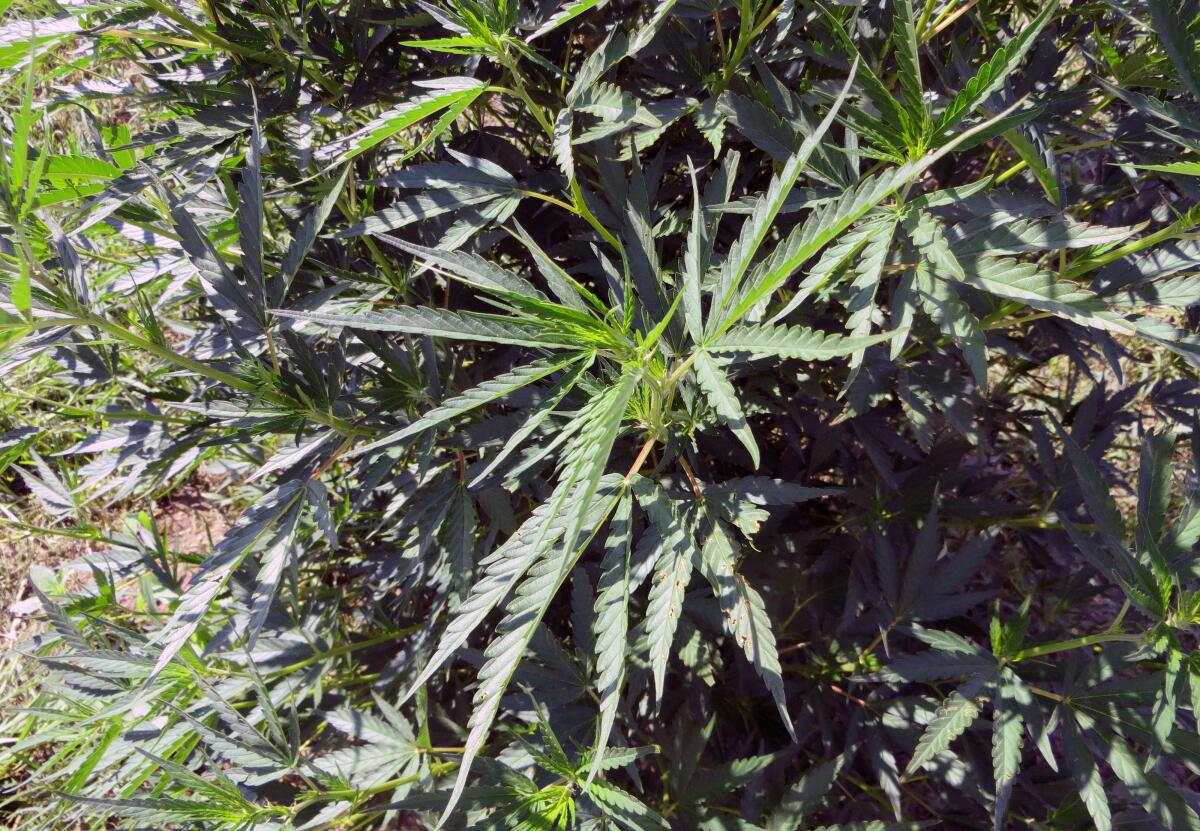Fresh out of prison, Beverly Hills con artist launches $9-million hemp scam, FBI says

- Share via
Mark Roy Anderson of Beverly Hills collected $9 million over four years from investors in his hemp farm on the outskirts of Bakersfield, but there was one problem, the FBI says: The farm did not exist.
Anderson, the investors discovered, is a convicted con artist who started swindling people at least three decades ago. He launched his purported hemp business immediately after his May 2019 release from the federal prison in Texas where he had served more than 11 years for an oil investment scam, federal authorities said.
On Tuesday, a federal grand jury in Los Angeles indicted Anderson on five counts of wire fraud. Prosecutors said he tricked investors into funding his sham hemp business through a company he called Harvest Farm Group.
Anderson, 68, used some of the money to buy a $1.3-million gated residence surrounded by citrus groves in Ojai, according to the FBI. He diverted another $2.3 million to personal expenses, including more than $650,000 for vintage and luxury automobiles, $13,000 for chartered private jet flights and $142,000 for merchandise from Williams-Sonoma, Ferragamo, Crate & Barrel and other retailers, the FBI alleged in a criminal complaint.
Anderson, who was arrested May 9 and has been in jail since, could not be reached. His attorney, Brett A. Greenfield, did not respond to a request for comment.
Anderson used to be a Nevada lawyer, but his criminal record got him disbarred in 1993. His rap sheet is extensive, and some of his crimes foreshadowed the alleged hemp swindle.
In 1988, Anderson got one victim to pay him $400,000 for an interest in a Beverly Hills office building that he falsely claimed to own, prosecutors say. He got another to pay $175,000 for an interest in a La Jolla building that he didn’t own. For those and related crimes, he pleaded guilty to grand theft and other charges and was sentenced to four years in state prison.
Also in the 1980s, Anderson ran a Ponzi-style scheme to cheat investors in the purported restoration of historic buildings around the country. He was sentenced to seven more years in prison.
He moved on to the oil investment swindle, which cost victims more than $9 million, according to prosecutors. After pleading guilty to federal charges of wire fraud and money laundering, Anderson sent the judge a handwritten letter in May 2012 saying he was “incompetent and inept in dealing with money.”
L.A. swindler David Bunevacz drove a yellow Lamborghini and posed as a weed mogul as he fleeced friends, his dentist and scores of others in a brazen series of scams
“Twenty years ago, I went to prison for fraud,” Anderson wrote. “It was a horrible experience. I lost my marriage, all my possessions. It destroyed my self-respect. When I got out, I was terrified to ever go back.”
He started drinking heavily around the time he hatched the oil scam, which “made matters worse,” Anderson wrote. “I would pray at night not to wake up.”
Anderson, then in his 50s, told the judge he was concerned he would die in prison. “I am damaged and broken,” he wrote. “There is nothing left in me. My productive life is over.” He called himself “a failure, a fraud and an embarrassment.”
His brother, Stan Anderson, sent the judge a letter saying Mark had served on the business advisory council of the National Republican Congressional Committee. He attached an autographed photo of former President George W. Bush thanking Mark Roy Anderson for supporting the Republican National Committee.
After serving about seven years of his sentence, Anderson was released from prison under an elderly offender pilot project and placed in home detention in Beverly Hills for 18 months. In November 2020, he started a three-year term of supervised release. A condition of his probation was that he not engage in investment projects.
But by then, his hemp investment venture was well underway, according to an arrest complaint by FBI agent Richard T. Higgins. Victims told the FBI that Anderson claimed he was growing hemp on his farm in Kern County for conversion into medical-grade cannabis products, Higgins wrote.
Two of the investors eventually hired a private investigator. They discovered that the purported hemp farm was actually a vineyard that Anderson did not own, despite his assurances that he’d completed three successful harvests that were “extremely profitable,” Higgins said.
The photos of the would-be harvests turned out to be stock images downloaded from the internet, according to Higgins.
An attorney for one of the investors had asked Anderson to confirm that he had no prior criminal convictions and was not the Mark Roy Anderson who had gone to prison for fraud. Anderson, Higgins said, assured the attorney that the con artist was somebody else.
More to Read
Sign up for Essential California
The most important California stories and recommendations in your inbox every morning.
You may occasionally receive promotional content from the Los Angeles Times.











